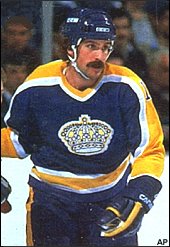 It took him a few seasons, but by 1979-80 Charlie Simmer had established himself as one of the most prolific scorers of his time.
It took him a few seasons, but by 1979-80 Charlie Simmer had established himself as one of the most prolific scorers of his time.Then tragedy struck.
Despite scoring 45 goals and 99 points in his only season of major junior hockey with the Soo Greyhounds, "Chaz" wasn't drafted until 39th overall in 1974. The California Golden Seals selected him in the 4th round.
Simmer never got untracked in California or Cleveland (the Seals moved to Ohio in 1976). He was released and signed as a free agent with the Los Angeles Kings, the team where he would become famous.
It wasn't an instant hit though. Simmer spent a year and a half in the minors. In fact he almost quit hockey altogether before finally catching on with the Kings full time in 1978-79. He finished the year with a very impressive 21 goals and 48 points in 38 games.
Moved to the left wing, Simmer was a perfect match on a line with Marcel Dionne and Dave Taylor. The trio were quickly dubbed the Triple Crown line - one of the most famous units in hockey history.
For those who didn't notice Simmer's late season exploits, Simmer continued his excellence in the following season, leading the league in goal scoring with 56 goals. He added 45 assists for 101 points in just 64 games. He set the modern day NHL record with goals in 13 consecutive games.
In 1980-81, Simmer and New York Islanders superstar Mike Bossy both chased down Maurice "Rocket" Richard's legendary mark of 50 goals in 50 games. Bossy equaled the record, but Simmer fell just short. Simmer scored a hat trick in the 50th game of the year, but fell one shy with 49 goals in 50 games. He ended up with just 7 more goals, as he was limited to just 65 games.
A terrible injury ended Simmer's dream season on March 2, 1981. During a game in Toronto, Simmer's right leg was shattered. He didn't skate again until late November. His damaged leg was held together by a metal plate and nine screws.
Simmer's 1981-82 season was a tough one. He spent most of the year learning to play with his bad leg. He got into 50 games, scoring 15 times. Much of his ice time was limited to spot duty and power play shifts. By the playoffs he was regaining his old form, scoring 4 goals and 11 points in 10 games.
"I had to start out early with spot duty and power play shifts. And the biggest thing was to develop confidence that I could depend on the leg. You've got to be able to play without even thinking about it."
Simmer did learn to trust his leg, and also regained his speed. He wasn't a speedy player by any means, but for a man of his size, he had a surprising, powerful burst in his stride.
Simmer returned to a point a game form in 1982-83, scoring 80 points in a full 80 games. However only 29 of those points were goals. While he played his first full healthy season, the goal scoring machine seemed to be missing some of its potent cogs.
Simmer was able to return to his goal scoring form in 1983-84. He scored 44 times in 79 games, while adding 48 assists for 92 points. Most of his goals, as always, were garbage goals. He had a powerful wrist shot and fired the puck from anywhere, but like Tim Kerr he learned he was immovable in front of the net and a scoring machine in the slot.
Following an ugly contract dispute, the Kings traded Charlie to Boston after just 5 games in 1984-85. In Boston Charlie put together some nice seasons. He scored 34 goals his first year. In 1985-86 he was having one of his best seasons ever, but as usual he saw it ended by injury. Simmer got into only 55 games, but scored 36 goals.
Simmer appeared in all 80 games in '86-87, scoring 29 goals and 69 points. He spent one more year in the NHL, with the Pittsburgh Penguins. He bowed out quietly, scoring just 11 goals in 50 games with Mario Lemieux and company.
Simmer spent the 1988-89 season getting hockey out of his system by playing in Germany. He later returned to North America, playing in parts of two seasons with the IHL's San Diego Gulls.
Simmer was a two time NHL All Star, and was also given the Bill Masterton trophy in 1986 for his dedication to the game. Despite so many injuries, Charlie always battled back.





